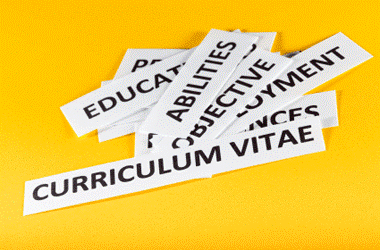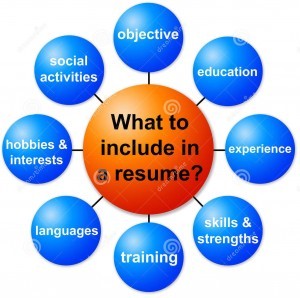Resume writing is an art
 Rarely do we see resumes tailored to fit a job. Sure, many of the background and academic details tend to remain the same but in a good resumes the tone and accent changes. Rarely does peole pay attention to while writing their resume. You remain the same person, but your description, narrative changes with a new perspective depending on the job you are applying for. It is therefore advisable to constantly re-examine and refine your CV. A CV speaks volumes about us in absentia.
Rarely do we see resumes tailored to fit a job. Sure, many of the background and academic details tend to remain the same but in a good resumes the tone and accent changes. Rarely does peole pay attention to while writing their resume. You remain the same person, but your description, narrative changes with a new perspective depending on the job you are applying for. It is therefore advisable to constantly re-examine and refine your CV. A CV speaks volumes about us in absentia.
Over some time and with experience, while looking at your CV your presentation skill and technique for language will improve. Couple this to the natural self-confidence you develop during spells of employment and your CV should for sure reflect that. It’s all about refining what you say and how you say it in the most concise way, and you’ll be surprised how your perceptions evolve on different dimensions in CV.
Yes, your CV speaks volumes about who you are, how you think, your strengths and weaknesses – though we do not present our weaknesses. It gives an image of your finesse, your capability, your background, your skills, intelligence etc. Your CV should be confident. Employers not only want to hear about your appropriate successes but also why and how you’ve achieved them. This confidence however should not be presented in an over-stating manner. Nobody can ever be great without any substance. Avoid wordy jargon, exaggeration or buzzwords. Let your CV stand out by giving the helpful facts and figures. Give those hard evidences those which are self-explanatory. Don’t clutter your CV with too many things about yourself. Don’t lose the purpose in the midst of it. A good CV remains sharp and snappy for quick reference. Adopt the right tone throughout the CV.
Avoid pessimism: If you have had to face adversities, mention it with words such as “challenge”, faced. Also, do not shy to mention how you faced them. Avoid words such as “hate”, “quit”, or “disagreed” Alternative suitable phrases would be “overcame”, “influenced”, or “re-approached.”
 If you are applying for a journalist’s job then your skills such as editing, writing, fluency over languages, your grasp to understand things, an eye for detail etc should be highlighted. Remember, one size doesn’t fit all; you will need different versions of your CV depending on whom it is aimed at. I often suggest people to avoid using standard templates. Instead, write it uniquely. Focus on relevant experience and transferable skills from previous jobs which you have learnt.
If you are applying for a journalist’s job then your skills such as editing, writing, fluency over languages, your grasp to understand things, an eye for detail etc should be highlighted. Remember, one size doesn’t fit all; you will need different versions of your CV depending on whom it is aimed at. I often suggest people to avoid using standard templates. Instead, write it uniquely. Focus on relevant experience and transferable skills from previous jobs which you have learnt.
The HR manager looks out for some of these traits in your CV: they are enthusiasm, because enthusiasm drives employee engagement and innovation. Communication skills – no organization is able to compromise on importance communication in today’s globalized marketing environment. Next is creativity. Organizations crave for creative people. Thinking out of the box is an extraordinary quality. If you have it, write it foremost in your CV. In today’s age of entitlement and instant gratification, the critical concept of commitment stands out in a CV. Do present it in good words. Team spirit is very important in any field of life because it binds people together of different temperaments, different attitudes. If you can lead and activate people in group, trust me you have again an extra ordinary quality. Highlight it. HR managers look for another quality and that is openness to new ideas, new processes, and new people and so on. As corporations are ever changing entities, your ability to change with it is crucial. Your CV must speak how you adapted in the past and how you can do it again, if required.
One most important advice is keeping your research on; examine not only the work you want to do but where you want to work. When you find a job that you want to do and feel qualified to do, investigate the company, its culture as well as what is said and left unsaid about the company. Be sure about the work culture of the company. You should not land in soup.
And, also one of the hallmarks of your personality is emotional Intelligence. It is your ability to match the communication style with the organization through your CV, on email, on mobile or social media. Pay attention to not only the key words being used by the company in describing a position you are applying for but also how they have placed those words. Match their style so that you can spoon-feed them about your brilliance by helping them to see that you have the qualification, talent and experience they need.
 So, let your CV have the following:
So, let your CV have the following:
Contact details: It’s important to provide a range of up-to-date contact options including your home address, your main phone number and your email address to make it easy for employers to get in touch with you.
Employment history: Include the jobs that are relevant to the position you are applying for. If you haven’t had much applicable experience, be honest about it. However, you may express your interest by stating your grasping and learning abilities or you may want to include your entire work history.
Education and qualifications: Your education and qualifications may not be directly related to the job you are applying for, but they’re still important achievements that any employer will want to see. These days’ organizations are not too obsessed with educational qualifications. They prefer practicality of an individual.
Skills and strengths: Strength is something you’re naturally good at. A skill is something you acquire with education and experience. Make sure to express how your skills and strengths will help you to do well in the job.
References: Give references of people who know you fairly well and those who will speak on your behalf. You don’t have to include references in your CV and leaving them out will save you space, but make sure to state at the end of your CV that they are available on request.
If your CV is shortlisted and you are called for an interview, the interviewer might ask you to “walk him/her through your resume.” When you are asked to do so – you should be able to talk about each section of your resume in a linear, lucid, and enthusiastic fashion. Do not go too much in-depth into any one item. Do not bore the interviewer and do not remain superficial either. Touch on your academic, professional, leadership, technical, and personal qualifications, concluding with a statement about why these experiences are important for your industry.
Lastly, use a good simple format. Check and re-check spelling and punctuation. Keep sentences short to avoid confused punctuation and, if you can, give it to a friend to check it over. Spell check should be the very last thing you do before sending it off.
If you are not applying for some time now for a new job, take some time off and work on your CV – it’s worth it.













































